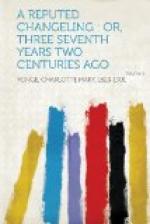Peregrine, who never perhaps had spent a happy or fearless hour with him, and had dreaded his coming, felt probably for the first time the mysterious sense of home and peace given by the presence of those between whom there is the tie of blood. Not many words passed; he was hardly in a state for them, but from that time, he was never so happy as when his father and brother were beside him; and they seldom left him, the Major sitting day and night by his pillow attending to his wants, or saying words of prayer.
The old man had become much softened, by nothing more perhaps than watching the way in which his daughter-in-law dealt with the manifestations of the Oakshott imp nature in her eldest child.
“If I had understood,” he said to Dr. Woodford. “If I had so treated that poor boy, never would he have been as he is now.”
“You acted according to your conscience.”
“Ah, sir! a man does not grow old without learning that the conscience may be blinded, above all by the spirit of opposition and party.”
“I will not say there were no mistakes,” said the Doctor; “and yet, sir, the high standard, sound principle, and strong faith he learnt from you and your example have prevailed to bear him through.”
The Major answered with a groan, but added, “And yet, even now, stained as he tells me he is, and cut off in the flower of his age, I thank my God and his Saviour, and after Him, you and yours, that I am happier about him than I have been these eight and twenty years.”
With no scruple, Major Oakshott threw his heart into the ministrations of Dr. Woodford, which Peregrine declared kept at bay the Evil Angel who more than once seemed to his consciousness to be striving to make him despair, while friend and father brought him back to the one hope.
From time to time Anne visited him for a short interval, always to his joy and gratitude. There was one visit at last which all knew would be the final one, when she shared in his first and last English Communion. As she was about to leave him, he held her hand, and signed to her to bend down to hear him better. “If you can, let good Father Seyton at Douai know that peace is come—the Evil One beaten, thanks to Him who giveth us the victory—and I thank them all there—and ask their prayers.”
“I will, I will.”
Some one at the door said, “May I come in?”
There was a sunburnt face, a head with long brown hair, a white coat.
“Archfield?” asked Peregrine. “Come, send me away with pardon.”
“’Tis yours I need;” and as Charles knelt by the bed the two faces, one all health, the other gray and deathly, were close together. “You have given your life for mine, and given her. How shall I thank you?”
“Make her happy. She deserves it.”
Charles clasped her hand with a look that was enough. Then with a strange smile, half sweetness, half the contortion of a mortal pang, the dying man said, “May she kiss me once?”




